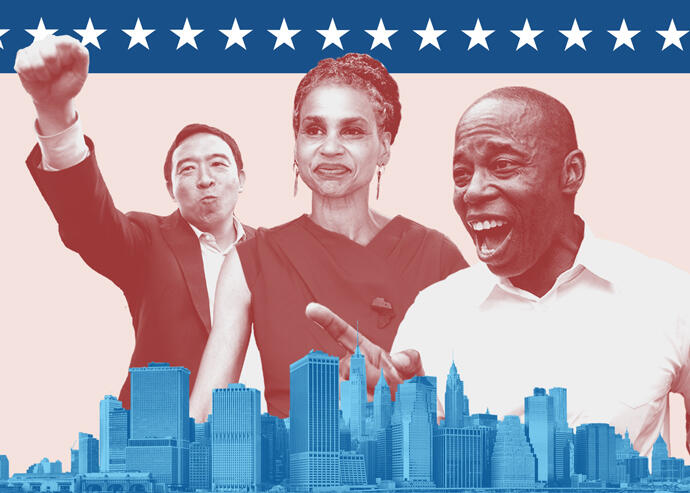
From left: Andrew Yang, Maya Wiley, Eric Adams, Scott Stringer and Kathryn Garcia (Getty, iStock)
Early results in the Democratic primary for mayor show Eric Adams, a candidate favored by the real estate industry, in the lead.
The Brooklyn borough president captured about 31 percent of Democrats’ No. 1 picks in the initial tally under a new, ranked-choice voting system. But other candidates could overtake him as subsequent rounds of counting — including of absentee and affidavit ballots — add to their totals.
Maya Wiley — the candidate who most worried real estate interests — and Kathryn Garcia were behind Adams by about 9 and 11 percentage points, respectively, with nearly 90 percent of the count completed, while Andrew Yang conceded after coming in a distant fourth with just under 12 percent of No. 1 votes. None of the nine other Democratic candidates were anywhere near double figures.
The unofficial tabulation includes only first-choice votes cast Tuesday and during early voting. A candidate needs more than 50 percent of votes to win — an impossibility on the first count in a crowded race featuring at least four contenders who were considered viable when voting began this month.
But candidates who win the most No. 1 votes in elections with ranked-choice voting have won the vast majority of those races. Adams’ lead puts him in a commanding position.
The city’s Board of Elections will release an updated count, taking into account voters’ second through fifth choices, June 29. A third count, released July 6, will include clearly cast absentee ballots. The winner may be apparent by then, but will not be official because corrected absentee ballots and any disputed ballots will be counted later still.
The Democratic primary winner will be considered a shoo-in to win the November election over the Republican nominee, media personality Curtis Sliwa, who defeated taxi activist Fernando Mateo in the little-noticed GOP primary Tuesday. Term limits prevent Mayor Bill de Blasio from seeking re-election.
Real estate largely favored Adams, pouring contributions into his campaign fund and a political action committee, PAC Strong Leadership NYC, that ran advertisements to promote him. But as Kathryn Garcia — like Adams, a proponent of building lots of housing — gained ground in the polls, some in the industry started hedging their bets.
For example, developer Gary Barnett, who contributed $250,000 to Adams’ PAC, gave $45,000 to pro-Garcia group New Generation Leadership early this month. Last week, an entity with ties to Vornado Realty Trust gave the PAC $100,000, as first reported by Politico.
During a forum held by the Real Estate Board of New York this month, Yang, the front-runner in early polling, told the trade group that he wanted to be the “pro-growth, pro-development, pro-building, pro-small business mayor.” But the early frontrunner had already lost momentum as voters became familiar with Adams, Garcia and Wiley.
Yang had previously released a housing plan that called for building homes and marginalizing not-in-my-back-yard groups. A pro-Yang PAC received money from billionaire investors including Ken Griffin and Jersey City-based nonprofits with ties to LeFrak.
City Comptroller Scott Stringer, the only citywide official in the race, took an opposite approach, centering his campaign on killing developers’ tax breaks. He won endorsements from some of the state’s top progressive officials and the Working Families Party, but lost them when an unpaid worker on Stringer’s 2001 campaign accused him of sexual abuse and harassment.
Wiley, de Blasio’s former counsel, then emerged as the left’s favorite, earning the support of Rep. Alexandria Ocasio-Cortez and Sen. Elizabeth Warren amid the collapse of Stringer and an even further-left progressive, Dianne Morales, whose campaign was destroyed by a campaign staff revolt and a water meter scandal.
Wiley and Stringer both called for ending Affordable New York, a tax break formerly known as 421a, though that power rests with the state. Developers have long argued that building a significant amount of affordable housing in the city would be impossible without the incentive.
Two other candidates, former housing official Shaun Donovan and ex-banker Ray McGuire, raised ample funds but never gained traction with voters, though the former earned points with the industry as a Bloomberg administration alumnus and the latter for his business experience.



